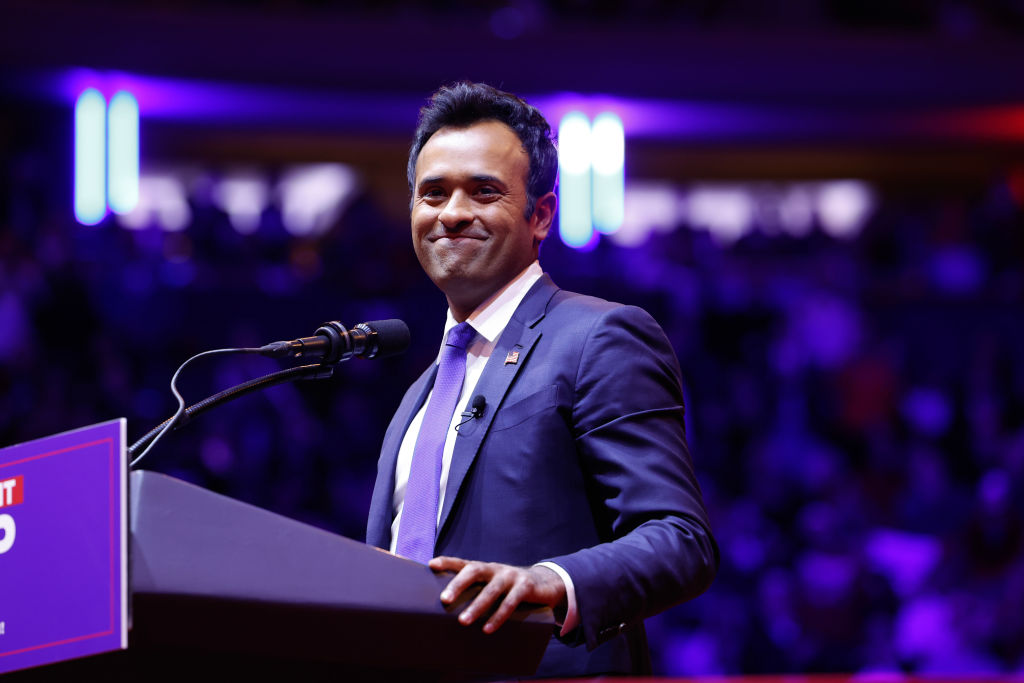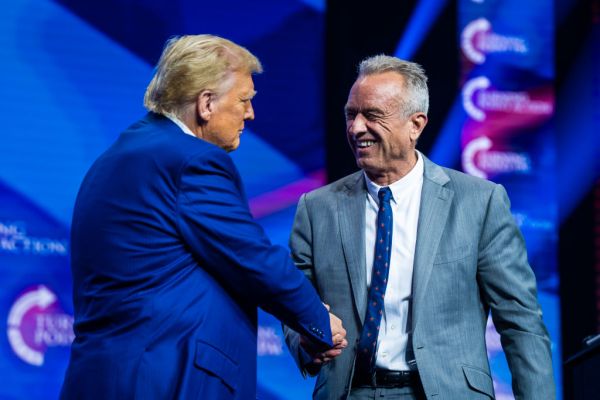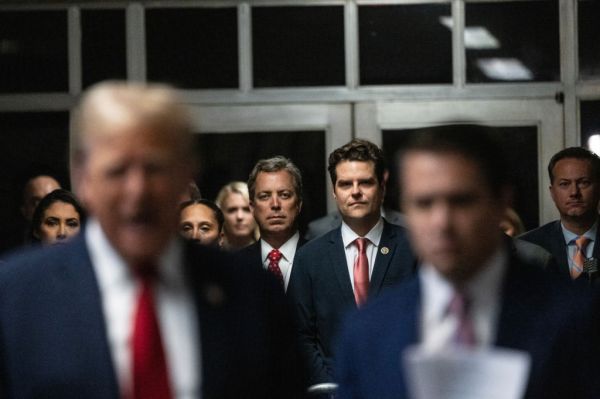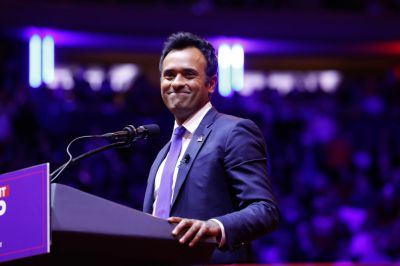Two weeks have passed since Donald Trump’s second election win, and the once-and-future president is choosing political appointees for his second administration at a breakneck pace. Among two of the most notable picks? The world’s richest man and a 2024 GOP presidential hopeful.
Early last week, Trump tapped Elon Musk and Vivek Ramaswamy to lead the newly created “Department of Government Efficiency” (DOGE). What form DOGE will ultimately take is anyone’s guess, though there’s certainly something ironic about creating an entity to reduce redundancy and then giving it two heads. But we do know that the new department is being billed as an effort to shrink the size and scope of the federal government. From this perspective, picking Musk and Ramaswamy—two avid free marketeers—makes a lot of sense.
But looked at another way, Ramaswamy’s pick is particularly curious. Why? Because the former biotech entrepreneur has been rebranding himself as one of the chief expositors of Trump’s America First agenda—with a twist.
At this year’s National Conservatism Conference, Ramaswamy labeled his view as “national libertarianism.”He later described the view to the New York Times’ Ezra Klein as a strand of America First focused on “dismantling the existence of that nanny state in all of its forms: the entitlement state, the regulatory state, and the foreign nanny state.” Listen to him a bit more closely, though, and Ramaswamy’s vision begins to appear more like an ambitious attempt to repackage libertarianism in nationalist garb.
For instance, Ramaswamy is focused on dismantling what he calls the “unconstitutional fourth branch of government,” meaning the federal bureaucracy, and wants to slash its employment by 75 percent. “Re-constitutionalizing” the administrative state is one thing; ditching most of the largely innocuous bureaucrats who enable a country of 350 million people to function is pure nihilism. And it’s not clear most postliberal MAGAophiles want it done.
After all, Trump is an ideological cipher. His cryptic politics have spawned a cottage industry dedicated to constructing theoretical scaffolding for his movement, working overtime to backfill his agenda with intellectual weight. Unfortunately for Ramaswamy, the people doing this Sisyphean work are not his like-minded fellow travelers—they’re an entirely different set of ideologues who openly reject him. Though Ramaswamy is aware of this incongruity, he believes his policy blueprint will win the day. He might be a little too sure of himself.
The MAGA intelligentsia Ramaswamy is trying to hitch his wagon to—an odd hodgepodge of Catholic critics of the Enlightenment and outright “blood and soil” nationalists—have come to wholly reject the wisdom of free trade, civic nationalism in favor of ethnic nationalism, and immigration of any kind. For them, libertarianism hasn’t just failed; it is the source of “rot in the existing order” that they seek to overhaul.
These reactionaries no longer see libertarianism as relevant, let alone redeemable. They’ve grown suspicious of the idea that markets can remedy any societal ills or that a globalized world can coexist with a cohesive American identity. Their leading voices are already celebrating Trump’s reelection as the dawn of a new postliberal era. New Right theorists, like Hungarian Institute of International Affairs president Gladden Pappin, are done questioning whether they can fully seize the reins of state power. Others openly wonder whether the state can be used to reward friends and punish enemies. They now want to explore what they should do with this power, irrespective of those pesky liberal limitations and norms.
It’s hard to imagine that Ramaswamy’s views will not come off as too generous to right-libertarian principles to them. He may venture into the feverswamp at times, but he still clings to a vision that is fundamentally at odds with his New Right counterparts. His coterie—backed by Silicon Valley barons like Musk and Peter Thiel—represents a strain of Randian techno-libertarianism that views Trump purely as a vehicle for their anti-state aims. They’ve latched onto MAGA not out of conviction but as a calculation, a recognition of the fact that it’s the only game in town in today’s GOP. These tech titans, who place their faith in technological innovation and the liberating potential of free enterprise, share very little with the postliberal worldview.
However, what unites these futurists with their neo-feudalist allies is their disenchantment with democracy. As disciples of the blogger Curtis Yarvin, the high priest of the “Dark Enlightenment,” Ramaswamy, Musk, Thiel, et al. seem to hold democratic inertia responsible for Silicon Valley’s failure to achieve its utopian promises. The potential erosion of liberal democratic norms doesn’t worry them, as they believe the engines of American productivity and innovation are being held hostage by lowercase-D democrat “statists.” While MAGA intellectuals envision a theocracy anchored in Catholic social teaching, the Silicon Valley contingent dreams of a Singaporean-style technocracy that would unleash their own creative potential.
One thing Ramaswamy gets right is that the GOP base is closer to him than to people like Pappin. Contrary to what some might tell you, Beltway conservatives aren’t the only ones who haven’t “moved on from the 1980s.” Most rank-and-file Republicans never experienced some sort of damascene conversion away from free-market orthodoxy. GOP voters like Trump simply because he is the id of the American right: bombastic, pugilistic, politically incorrect, and most importantly, anti-left. These people are still skeptical of anything that even resembles “socialism” and still recite what some in the MAGA intelligentsia would call “Zombie Reagan” mantras.
Mass sentiment, however, matters far less than elite ideology in shaping political outcomes. The intellectual center of gravity in Trumpworld lies firmly with the postliberal nationalists, not the techno-libertarians. Postliberal Adrian Vermeule is right: mass deportations and the abolition of the administrative state are mutually exclusive goals—only one vision can prevail. This divide will have enormous implications for a second Trump term as two camps jostle for influence. But as of now, it’s clear who wears the pants in this marriage of convenience.






Please note that we at The Dispatch hold ourselves, our work, and our commenters to a higher standard than other places on the internet. We welcome comments that foster genuine debate or discussion—including comments critical of us or our work—but responses that include ad hominem attacks on fellow Dispatch members or are intended to stoke fear and anger may be moderated.
With your membership, you only have the ability to comment on The Morning Dispatch articles. Consider upgrading to join the conversation everywhere.